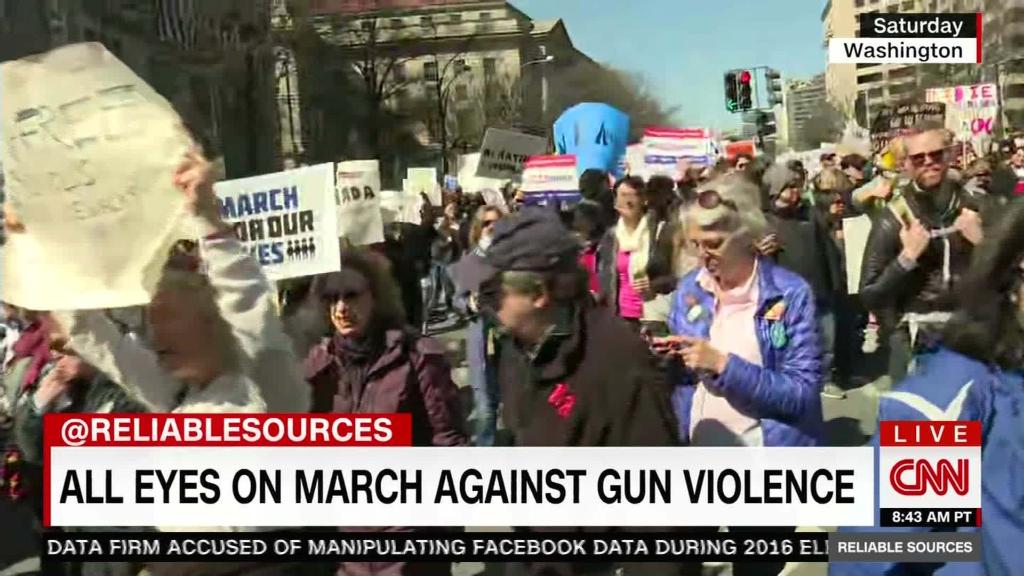
Is journalism a form of activism?
When I brought up this subject on CNN the other day, I was not expecting such an outpouring of reaction. It turns out I touched a nerve about the role of responsible journalism in a world full of opinion and noise.
Even NRA national spokeswoman Dana Loesch is now weighing in.
On Sunday's "Reliable Sources," I interviewed Rebecca Schneid, one of the editors of the Marjory Stoneman Douglas High School student newspaper. Schneid and several other student journalists were in Washington covering the March For Our Lives.
"I see a lot of Parkland students becoming activists, but you all were there as journalists," I said. "Do you see a difference right now between journalism and activism in what you're doing?"
"I think that for me, the purpose of journalism is to raise the voices of people that maybe don't have a voice," Schneid said. "And so I think that in its own right journalism is a form of activism."
She added that she does see "distinctions" between the two, "but I think that the partnership of the two is the only reason that we are able to make a change."
The @ReliableSources Twitter account tweeted out the "journalism is a form of activism" quote, spurring thousands of reactions, replies and retweets. Many of the comments were critical -- along the lines of "THIS is the problem with journalism" and "just report the facts."
Several conservative websites picked up on Schneid's comment and wrote disapproving stories.
But it wasn't just partisans who bristled at the segment. Associated Press reporter Meg Kinnard replied to the tweet and said: "Journalism is not activism. This should not have gone unchallenged."
But Schneid had many defenders too, including people who pointed out that there's a long history of advocacy journalism in the United States and other countries. Schneid responded to the controversy too -- but let's save that for the end.
National Journal politics editor Josh Kraushaar had the single most-shared response to the CNN segment, with people both praising and criticizing his point of view.
"Journalism isn't activism; it's presenting the facts, honestly and objectively. It's this mentality that's killing trust in our profession," he wrote.
Kraushaar said he didn't want to single out Schneid, but "this mentality, at least from my experience, is more common among younger journalists."
Los Angeles Times national correspondent Matt Pearce took the other side.
"Journalism *is* activism in its most basic form," he wrote. "The entire basis for its ethical practice is the idea that a democracy requires an informed citizenry in order to function. Choosing what you want people to know is a form of activism, even if it's not the march-and-protest kind."
Pearce's point was that newsrooms are constantly picking and choosing what's worthy of coverage and what isn't. Deciding what belongs on the front page of the paper is the classic example of this.
Pearce added: "Does anybody think that even the fairest and most diligent of investigative reporters wrote their horrifying stories hoping that nothing would change?"
Stories about abuse of power and misuse of taxpayer money come to mind. Academics sometimes call this the "agenda setting" function of journalism.
Political columnist Ana Marie Cox responded to Pearce: "This was the exact reaction I had -- great reporting should make you want to take action, to *be active*! What makes it reporting is that you let go (for the most part) of what that action is."
Columnists and editorial board writers go a step or two further, advocating for specific solutions to problems.
Big chunks of the American media marketplace, from the liberal magazine The Nation to the conservative Fox News show "Tucker Carlson Tonight," could be described as advocacy journalism.
But Schneid's answer exposed some of the deep distrust of journalists that exists in the United States, particularly among President Trump's supporters.
The Daily Caller web site even printed the definitions of "journalism" and "activism" next to each other to argue that the two acts are very different.
Some of the people who reacted to Sunday's segment see journalists -- ideally -- as completely passive players, while others see journalists as active participants, standing up for marginalized people and fighting against misinformation.
"When people in power are sowing doubt about basic facts, journalism looks like activism," the Twitter account for the NewsGuild union commented.
Wesley Lowery of The Washington Post responded with this definition of journalism: "Even beyond big, long investigations, journalists perform acts of activism every day. Any good journalist is an activist for truth, in favor of transparency, on the behalf of accountability. It is our literal job is to *pressure* powerful people and institutions via our questions."
But individuals like Loesch, the host of a show on the NRA's TV platform, don't see it that way. Loesch played Schneid's comments on Tuesday and said "Okay, that's wrong. Journalism is not activism. I've been both and unlike those in the media today, I never pretended that one was the other, nor did I attempt to hide my own opinions."
She added: "Journalism is self-sacrificing. You're sacrificing your own narrative so that your readers can come to a conclusion based on the facts you give them."
And Schneid reacted to all of the social media chatter with her own tweet on Tuesday.
She called back to Kraushaar's statement that "Journalism isn't activism; it's presenting the facts, honestly and objectively."
"Journalists can USE the facts to describe an issue that plagues society," like gun violence, Schneid said. "It's the journalists who present these facts and elevate the voices of the oppressed that allow for actual change to occur."


